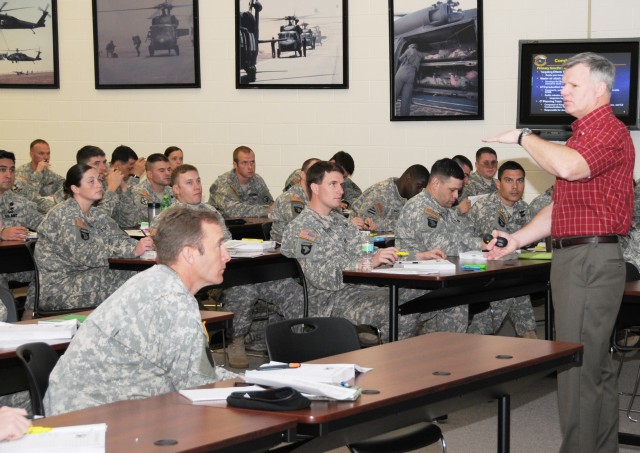FORT RUCKER, Ala. -- Imagine being an Army captain who's just returned from Afghanistan.
You've worked with your Air Force counterparts, and had that experience recently.
Now, in front of your classroom at Fort Rucker is a trainer who has been back from the joint warfight for a year or more, so your instructor's experience is more dated than yours.
Finding professional military education opportunities to strengthen instructor credibility is the reason Maj. Lee Ambrose, A Company, 1st Battalion, 145th Aviation Regiment, commander, brought the week-long Joint Firepower Course, and the Army Joint Support Team instructors to teach it, at Fort Rucker for the first time Feb. 28-March 4.
"It was really identifying a need in the community and Armywide to understand how the Air Force operates in working with Joint assets, especially Aviation assets," Ambrose said. "As you see more and more Unmanned Aircraft Systems, and all kinds of different platforms, that level of training and interaction is something you don't get in flight school. You really only get it in your deployment experience. So we're trying to bring that to the schoolhouse. This course makes our cadre more experienced and prepared to teach current operational roles and doctrine."
Ambrose was among nine members of his company enrolled in the course, which Soldiers usually travel elsewhere to take. Bringing five Army and Air Force instructors here from Nellis Air Force Base, Nev., and Hurlburt Field, Fla., resulted in savings in training costs, and opened up 60 course slots to Fort Rucker Soldiers to benefit from the opportunity, Ambrose said. That cost savings results in better use of taxpayer dollars for the Army and the Aviation Branch.
Ambrose's company teaches five courses, including the Captain's Career Course, Warrant Officer Advanced Course, and Aviation Pre-command Course. The potential impact of the professional development for A Company alone could reach upwards of 500 students per year, he said.
The course, which is ideal for company grade officers and noncommissioned officers with some operational experience in a unit, is very popular with Soldiers and Airmen who are soon deploying. The goal is to provide them with an understanding of the actions required to synchronize and integrate joint fires in support of the ground commander's intent, said Col. Mike Klingele, director of the Army Joint Support Team based at Hurlburt Field, Fla., which is part of the Combined Arms Center for Training at Fort Leavenworth, Kansas.
"The training and practical exercises help develop skills that Soldiers will use every day on the battlefield in Afghanistan. We try to package and deliver the training as tools to add to their toolkits," Klingele said. "The written tests are very challenging, so when they walk out of here with their certificates they should be really proud."
The students, from the ranks of major down to private, were taught on a condensed timeline which covered the normally 14-day graduate-level course in one week, said Maj. John Fernandez, Aviation Captain's Career Course instructor, who was instrumental in bringing the course to Fort Rucker. Fernandez also took part as a student in the course.
"I'm a ground guy. We use this for bad days," Fernandez said, pointing to the nearly 500-page workbook for the course. "I come from an operational background, and what I like to do is look for training opportunities to keep all Soldiers current on what's going on outside of their everyday occurrences."
Fort Rucker Soldiers have a wide diversity in specialties and skills, work as trainers and doctrine developers, and have a chance to impact the next generation of warfighters with what they learn in the course, Klingele said.
"Here we get to reach the folks who will, in turn, pass this (training) on to the larger audience of deployers," he said. "Additionally, we do anything we can to give a Soldier more time with his head on his pillow at home, more time with his Family. We're looking forward to coming back when Rucker needs us again."


Social Sharing